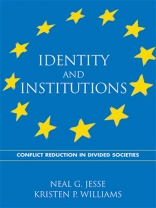Explores the role of international institutions in reducing conflict in multiethnic societies.
How can conflicts between various nationalist/ethnic groups be reduced? Combining theory with case studies of Spain and Ireland, Neal G. Jesse and Kristen P. Williams develop an argument favoring a solution that links resolving issues of identity and perceptions of inequality to the establishment of cross-national, democratic institutions. These institutions can affect deeply held attitudes by promoting overlapping identities and pooling sovereignty. Overlapping identities reduce tension by creating an atmosphere where different ethnic groups lose their strict definitions of Self and Other. Pooling sovereignty across a number of international (and national) representative bodies leads to increased access to governmental policymaking for all parties involved, with each nationalist/ethnic group having a stake in government. Increased access, moreover, reduces threat perceptions and ethnic security dilemmas, and increases trust-all of which play an important role in overcoming such conflicts.
Table of Content
List of Illustrations
Preface
1. Theory of Identity and Institutions
2. Inequality and Nationalist Conflicts: The Dual Process of State-Building and Nation-Building in Spain
3. Integrating Strong National Identities in the European Union
4. Protestants, Catholics, and the Good Friday Peace Agreement in Northern Ireland
5. Conclusion: Institutions and the Construction of Identity
Notes
Bibliography
Index
About the author
Neal G. Jesse is Assistant Professor of Political Science at Bowling Green State University. Kristen P. Williams is Assistant Professor of Government and International Relations at Clark University and the author of Despite Nationalist Conflicts: Theory and Practice of Maintaining World Peace.












